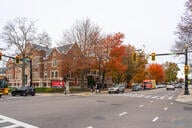You have /5 articles left.
Sign up for a free account or log in.
If your task is matching an incoming graduate student with another student mentor, a logical approach is to look at academic interests.
That factors prominently into who advises whom at Purdue University's School of Electrical and Computer Engineering. But a new mentorship initiative takes much more into account, including study habits, favorite sports and recreational activities, and movie and music preferences.
Starting this fall, the school is planning to ask both new and returning graduate students to fill out a Web questionnaire that asks about both professional and personal interests. Students will be matched based on their replies.
Mark J.T. Smith, who heads the school and is overseeing its mentoring program, is selling the Web portal as an eHarmony-style matching service for graduate education. Still, sharing an interest in Pink Floyd or The Godfather won't necessarily lead to greater synergy when discussing a dissertation. So why include such factors in a survey?
"The theory is that the key to good mentoring is frequent interaction," Smith said. "If you get people who like to do the same things, there are more opportunities for meetings. This isn't dating, but the principle of finding someone to share time with still applies."
Smith is still tinkering with the new system for matching students. He's trying to determine what to ask and how to weigh the responses. For instance, should career interests be worth three times more than cuisine preference?
The hope, Smith said, is to compile a list for each student that ranks which classmates share the most common interests. He said that in his experience monitoring advising programs, the more mentors the better -- even if some matches don't pan out.
While Purdue's Electrical and Computer Engineering School hasn't had a formal graduate student mentoring program, students tend to form social networks that operate as such. One strong bond is nationality, Smith said, as international students from China and India -- two countries that are well represented in the school -- often mentor each other. Without those connections, students would likely feel isolated, he said.
But Smith said the students need other interactions as well. "What I think will happen in time, when our matching becomes more sophisticated, is that we'll be able to match a student who is part of the Chinese student group with someone outside the group."
Matias Zañartu, a doctoral student from Chile, said the size of the school and its composition (of students from tight-knit ethnic groups) often prevent inter-mingling. He said the matching program "is a good approach as far as mixing things up and getting students out of their normal boundaries."
Zañartu said meeting someone with a similar interest is a foot in the door that could translate to a discussion about academic issues.
Students will be encouraged to meet with their listed mentors but not required. Smith said he would like to see master's students paired with peers who are one year older so that decisions facing the mentees are fresh on the mentors' minds. The experiment will likely yield results by early next year, and Smith said the school hopes to assess the program before the academic year is out.
The graduate student project evolved out of a look at Purdue at how to best mentor young faculty. Smith, during a conference last week for academic department leaders, shared the results, showing that mentor-mentee faculty pairs in the school who had similar Myers-Briggs Type Indicator profiles proved no more compatible or successful in their relationships than other matches.
Smith said faculty members who heard of the graduate student matching program liked the concept for the students but didn't feel the need to have such a system in place for themselves. Professors there are often aware of each other's research areas and personalities, whereas the size of the graduate program makes it difficult for such familiarity, according to Smith.
"In pairing graduate students, it's hit or miss," he said. "Rather than leaving it up to chance, we're trying to come up with a formal solution."




